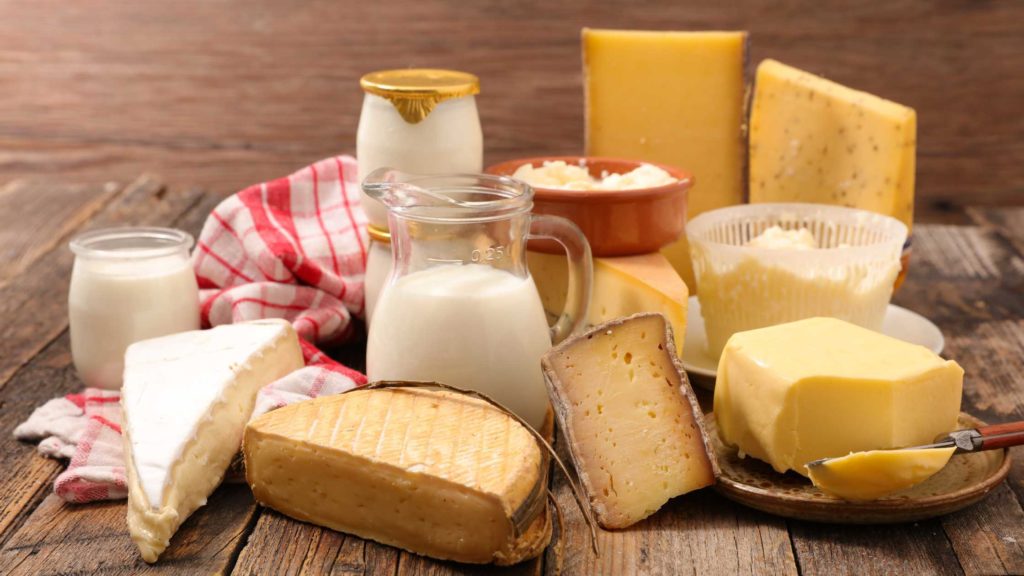Menu
Download our mobile app
today for exclusive savings and rewards!
today for exclusive savings and rewards!
Get Prepared for Easter with Fresh Farms | Now Available Baby Lambs
(Please Ask Our Meat Department For Assistance. Available at all stores except for Devon Ave)

Whether milk, cheese, yogurt, or butter, dairy products have long been the foundation of global diets. Especially in Western culture, these products are known for their rich nutritional profile. However, there’s more to the dairy story than meets the eye.
From here on, we will look into the world of dairy consumption. We are going to look at its health benefits. We will provide a perspective wherein you can make good decisions for your well-being.
Even if you’re a seasoned dairy lover, considering a dairy-free diet, or somewhere in between, we will offer valuable insights when consuming dairy products and its good effects on our health.
People celebrate dairy products because of their rich nutritional content. They come with a variety of essential vitamins, minerals, and macronutrients.
However, the health impact of dairy is not one-dimensional. Its nutritional value is superb! Let’s look into it more to make more informed dietary decisions, shall we?
Let’s start with the three common dairy products: milk, cheese, and yogurt.
1. Milk
As a prime source of calcium, milk contributes so much to our bones.
A cup of whole milk contains about 146 calories, 8 grams of protein, and 13 grams of carbohydrates. It also contains essential vitamins like Vitamin D and Vitamin B12.
2. Cheese
Generally, cheese is high in calcium and protein.
For example, a slice of cheddar cheese has about 113 calories, 7 grams of protein, and 200 mg of calcium.
However, it is essential to note that cheese can be high in saturated fats and sodium.
3. Yogurt
When it comes to unsweetened yogurt, it is an excellent source of protein, calcium, and probiotics. All these nutrients are beneficial for gut health.
A cup of plain, low-fat yogurt typically has about 154 calories, 13 grams of protein, and 450 mg of calcium.
Now, we know that it’s a lot to take with all these numbers and benefits, but you have to understand that dairy products are not just about calcium and protein; they also come with many essential vitamins and minerals.
1. Vitamin D – This vitamin is crucial in promoting bone health. It helps the body absorb calcium.
2. Vitamin B12 – An essential vitamin for nerve function. It contributes to the production of DNA and red blood cells.
3. Potassium – This mineral can help manage blood pressure levels by countering the effects of sodium.
4. Magnesium – This mineral is vital in muscle and nerve function, blood glucose control, and blood pressure regulation.
5. Probiotics – These are beneficial bacteria that can improve gut health, boost the immune system, and even enhance mood.
Remember, though dairy products are nutrient-rich, you consume them as part of a balanced diet. Always consider these factors according to your health needs and dietary preferences.
Dairy products have always been a go-to, and we won’t even be significantly surprised when health benefits extend beyond simply providing nutritional content.
We widely recommend these products because of their bone health contribution, especially to children.
A study in the National Library of Medicine (2014) found that drinking more milk when young can help build stronger bones. This is important because solid bones reduce the risk of breaking bones as you age.
Dairy products can also contribute to your weight management. Being high in protein means maintaining the feeling of fullness and, as a result, may assist in controlling caloric intake.
A review also by the National Library of Medicine (2017) said that eating more than the suggested amount of dairy in one day can help prevent weight loss—especially around your stomach.
Probiotics can also improve mental health and decrease specific allergies and eczema symptoms.
However, it’s important to note that more research is needed in this area, as the relationship between dairy consumption and heart health is complex and influenced by numerous factors.
Consulting with a registered dietitian or a healthcare professional is always the best action when making dietary changes or choices.
Becoming more aware and conscious about your diet is not a bad thing. But what if your store runs out of dairy?
Incorporating dairy alternatives have now been facing an increase in demand. That’s why we came up with dairy alternatives.
These alternatives are plant-based and deliver similar nutritional benefits.
1. Almond Milk
This is a trendy dairy alternative. It is known to have a subtly sweet taste. It’s usually low in calories and sugar and is a source of vitamin E. However, it’s typically low in protein compared to cow’s milk.
2. Soy Milk
Like cow’s milk, soy milk contains a good amount of protein. It comes with calcium and vitamin D. It also provides isoflavones.
3. Oat Milk
Known for its creamy texture and slightly sweet taste, it’s a fave for coffee and cereal. It comes with fiber, calcium, and vitamin D but less protein.
4. Coconut Milk
Coconut milk has a rich, creamy texture and a mildly sweet flavor. It’s higher in fat but lacks protein. Take note to read the label. It can contain sugar!
If you’re worried about running out of dairy supply, these alternatives can be an excellent choice.
As with any dietary decision, consuming dairy products should be balanced. A balance on your personal health needs, preferences, and ethical considerations.
Fresh Farms offers in-store and online products if you want to keep using dairy in your diet or explore dairy alternatives.
Our dairy range includes products sourced from farms that are sustainable for you and your family. We also carry a variety of dairy alternatives that cater to all dietary preferences.
Explore our dairy and dairy alternative ranges today, and confidently make your choices!
Eat well.
Save time.
Live better.